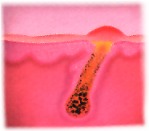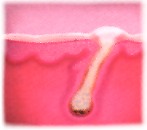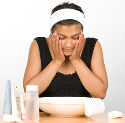Myth
Foods such as chocolate, greasy foods or coffee cause acne in most individuals.
Fact
Large medical studies show that diet does not contribute to acne in most individuals. Less than 2% of acne patients are affected by their diet. If you find there are foods that consistently make you break out with acne, it is common sense to try and avoid them. Foods with high iodine content, such as shellfish or seaweed, may cause flare-ups of acne
Myth
Acne is caused by dirt. Washing more will prevent acne.
Fact
Acne is caused by a combination of factors including hormones, bacteria, overabundance of oil, and plugging of skin pores. It is not caused by uncleanliness. Too much washing and over-stripping the skin with alcohol can actually make acne worse
Myth
Acne is a stage of life and you will grow out of it.
Fact
Over 85% of people age 12-24 have acne. As many as 50% of adults have some form of acne. This is a function of hormones and most of us can expect breakouts into our forties. Treat the problem to prevent permanent scarring
Myth
Acne is curable.
Fact
There is no cure for acne - not even the powerful prescription drug Accutane. Acne is definitely preventable and controllable with continued daily use of products such as Proactiv Solution, which contain acne-fighting ingredients
Acne Myths
One of the ways that you can help manage your acne is to separate fact from fiction. Understanding acne will help dispel your fears. Here are a few of the most common myths and their realities
You wake up in the morning and feel a tight, sore spot on your cheek. One look in the mirror tells you that you're in for another day of hiding your face and wishing for clear, unblemished skin. You think for the hundredth time - why me?
Relax - acne is not your fault! Acne is caused by your hormones and your skin's inability to slough off old, dead cells. This is determined by your genes and has nothing to do with the number of times you wash your face each day or the foods you eat.
It's important that you understand acne has nothing to do with bad habits or cleanliness. It all begins with your hair follicles, their oil producing glands and the cells that line these hair follicles. Usually, as the cells die and new cells replace them, your skin's natural oil mixes with the dead skin cells and are sloughed off. But sloughing is a very individual thing - some people do not shed dead cells evenly. When that happens, the cells become "over sticky", creating an uneven edge.


Acne begins when oil collects at the base of the hair follicle. It is trapped by dead skin cells forming a plug which swells beneath the skin.
Every normal hair follicle is lined with cells and has its oil producing gland. Normal sloughing carries away the dead skin cells and oil.
Acne is a common skin condition that develops when the oily substance that lubricates your skin and hair (sebum) and dead skin cells plug hair follicles. The resulting blemishes may include whiteheads, blackheads, pimples and cysts.
Acne is no longer just a rite of passage for teenagers. An increasing number of adults have stubborn outbreaks of acne, with stress and hormones taking the lion's share of the blame. It's estimated that 1 in 5 adults between the ages of 25 and 44 experiences acne and that nearly half of all adult women experience mild to moderate acne.
What is Acne?
Why Acne Happens:
Treatment
Acne may require medical treatment, depending on how it affects your social and work relationships. It can be physically and emotionally painful, and can lead to permanent scarring. Talk to your doctor or a dermatologist about which treatment or combination of treatments is right for you.
Acne treatments work by reducing oil production, speeding up skin-cell turnover or fighting bacterial infection or any combination of these effects. With most prescription acne treatments, you may not see results for 6 to 8 weeks, and your skin is likely to get worse before it gets better. Look for the light at the end of the tunnel!
Treatments may include:
Lotions. Acne lotions may dry up the oil and promote sloughing of dead skin cells. Prescription lotions may contain benzoyl peroxide, sulfur, resorcinol or salicylic acid, or a vitamin A acid (tretinoin or retinoic acid). Alpha-hydroxy products cause a mild shedding of unhealthy surface skin. Other powerful topical prescription agents for acne include azelaic acid (Azelex) and adapalene (Differin). There is also an acne lotion for sensitive skin called sodium sulfacetamide lotion.
Antibiotics. For moderate to severe acne, prescription oral antibiotics may reduce bacteria and fight inflammation. You may need to take the antibiotic for months. Some antibiotics for acne also come in topical form.
Oral contraceptives. The oral contraceptive norgestimate/ethinyl estradiol (Ortho Tri-Cyclen) also improves acne.
This uneven, sticky edge holds the oil, forming a plug in the hair follicle. It's a lot like a cork in a bottle. The cork-like plug holds the oil and bacteria in the follicle and it begins to swell as your skin produces more oil. Then your own white blood cells swarm around the follicle to kill the bacteria which results in a pimple or red bumps. This is acne.
The tendency to slough dead skin cells changes through life. The rate your skin produces oil is determined by your hormones. That's why acne often affects teens when their hormones begin to kick in. For women who have adult acne, their hormones are constantly fluctuating. It is these changes that can cause acne. Remember, acne depends on your genes and hormones and it's not your fault!
Acne: causes, treatments and myths
More Skin Care Articles

.
.
.
.
.
.
.
.
.
.
.
.
.
.
.
.
.
.
.
.
.
.
.
.
.
.
.
.
.
.
.
.
.
.
.
.
.
.
.
.
.
.
.
.
.
.
.
.
.
.
.
.
.
.
.
.
.
.
.
.
.
.
.
.
.
.
.
.
.
.
.
.
.
.
.
.
.
.
.
.
.
.
.
.
.
.
.
.
.
.
.
.
.
.
.
.
.
.
.
.
.
.
.
...................................................................................................................
...................................................................................................................
EXPLORE OTHER SKIN CARE ARTICLES

Shop Drugstore Skin Care ---->
Shop by Brand ---->
Shop High End Skin Care ---->
Shop by Brand ---->
......................................................................................
......................................................................................
sponsored by drugstore.com, beauty.com & sephora.com
Copyright © Styles101.com
CLARISONIC l Elizabeth Arden l Fresh l MD Skincare l philosophy l Somme Institute l Dr. Brandt l Kinerase l Murad l Peter Thomas Roth l Fusion Beauty l Clinique l RX for Brown Skin l Shiseido l Dermadoctor
Alpha Hydrox l Burt's Bees l Biore l Neutrogena l Clean & Clear l Olay l L'Oreal l Klein-Becker usa l SkinCeuticals l PCA SKIN l Cellex-C l OBAGI l RoC



